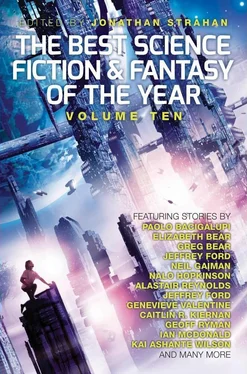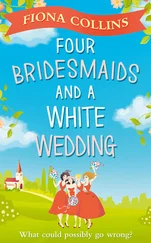The princess’s sisters emerged from the doorway of their two-room shack twenty paces from the tea stall. They peered in, two teenage girls in flourcaked dopattas and rose-printed shalwar kameez, and the younger one stifled a cry when the boy turned to her, eyes shiny and vacuous with delirium, and whispered, “He says the lightning trees are dying.”
The princess gasped. The customers pressed in, awed and murmuring. An elderly man with betel-juice-stained teeth gripped the front of his own shirt with palsied hands and fanned his chest with it. “The jinn has overcome the child,” he said, looking profoundly at the sky beyond the stall, and chomped his tobacco paan faster.
The boy shuddered. He closed his eyes, breathed erratically, and behind him the shadow of the tree fell long and clawing at the ground.
THE LIGHTNING TREEs are dying. The lightning trees are dying.
So spread the nonsensical words through the neighborhood. Zipping from bamboo door-to-door; blazing through dark lovers’ alleys; hopping from one beggar’s gleeful tongue to another’s, the prophecy became a proverb and the proverb a song.
A starving calligrapher-poet licked his reed quill and wrote an elegy for the lightning trees.
A courtesan from the Diamond Market sang it from her rooftop on a moonlit night.
Thus the walled city heard the story of the possessed boy and his curious proclamation and shivered with this message from realms unknown. Arthritic grandmothers and lithe young men rocked in their courtyards and lawns, nodding dreamily at the stars above, allowing themselves to remember secrets from childhood they hadn’t dared remember before.
Meanwhile word reached local families that a child had gotten hurt climbing the eucalyptus. Angry fathers, most of them laborers and shopkeepers with kids who rarely went home before nightfall, came barging into the Municipality’s lean-to, fists hammering on the sad-looking officer’s table, demanding that the tree be chopped down.
“It’s a menace,” they said.
“It’s hollow. Worm eaten.”
“It’s haunted!”
“Look, its gum’s flammable and therefore a fire hazard,” offered one versed in horticulture, “and the tree’s a pest. What’s a eucalyptus doing in the middle of a street anyway?”
So they argued and thundered until the officer came knocking at the princess’s door. “The tree,” said the sad-looking officer, twisting his squirreltail mustache, “needs to go.”
“Over my dead body,” said the princess. She threw down her polish rag and glared at the officer. “It was planted by my forefathers. It’s a relic, it’s history.”
“It’s a public menace. Look, bibi, we can do this the easy way or the hard way, but I’m telling you –”
“Try it. You just try it,” cried the princess. “I will take this matter to the highest authorities. I’ll go to the Supreme Court. That tree” – she jabbed a quivering finger at the monstrous thing – “gives us shade. A fakir told my grandfather never to move his business elsewhere. It’s blessed, he said.”
The sad-faced officer rolled up his sleeves. The princess eyed him with apprehension as he yanked one of her chairs back and lowered himself into it.
“Bibi,” he said not unkindly, “let me tell you something. The eucalyptus was brought here by the British to cure India’s salinity and flooding problems. Gora sahib hardly cared about our ecology.” His mustache drooped from his thin lips. The strawberry mole on his chin quivered. “It’s not indigenous, it’s a pest. It’s not a blessing, it repels other flora and fauna and guzzles groundwater by the tons. It’s not ours,” the officer said, not looking at the princess. “It’s alien.”
It was early afternoon and school hadn’t broken yet. The truant Gramps sat in a corner sucking on a cigarette he’d found in the trash can outside his school and watched the princess. Why wasn’t she telling the officer about the jinn? That the tree was its home? Her cheeks were puffed from clenching her jaws, the hollows under her eyes deeper and darker as she clapped a hand to her forehead.
“Look,” she said, her voice rising and falling like the wind stirring the tearshaped eucalyptus leaves, “you take the tree, you take our good luck. My shop is all I have. The tree protects it. It protects us. It’s family.”
“Nothing I can do.” The officer scratched his birthmark. “Had there been no complaint... but now I have no choice. The Lahore Development Authority has been planning to remove the poplars and the eucalyptus for a while anyway. They want to bring back trees of Old Lahore. Neem, pipal, sukhchain, mulberry, mango. This foreigner” – he looked with distaste at the eucalyptus – “steals water from our land. It needs to go.”
Shaking his head, the officer left. The princess lurched to her stall and began to prepare Rooh Afza. She poured a glittering parabola of sharbat into a mug with trembling hands, staggered to the tree, and flung the liquid at its hoary, clawing roots.
“There,” she cried, her eyes reddened. “I can’t save you. You must go.”
Was she talking to the jinn? To the tree? Gramps felt his spine run cold as the blood-red libation sank into the ground, muddying the earth around the eucalyptus roots. Somewhere in the branches, a bird whistled.
The princess toed the roots for a moment longer, then trudged back to her counter.
Gramps left his teacup half-empty and went to the tree. He tilted his head to look at its top. It was so high. The branches squirmed and fled from the main trunk, reaching restlessly for the hot white clouds. A plump chukar with a crimson beak sat on a branch swaying gently. It stared back at Gramps, but no creature with razor-blade jaws and hollow dust-filled cheeks dangled from the tree.
As Gramps left, the shadows of the canopies and awnings of shops in the alley stretched toward the tree accusatorially.
That night Gramps dreamed of the eucalyptus jinn.
It was a red-snouted shape hurtling toward the heavens, its slipstream body glittering and dancing in the dark. Space and freedom rotated above it, but as it accelerated showers of golden meteors came bursting from the stars and slammed into it. The creature thinned and elongated until it looked like a reed pen trying to scribble a cryptic message between the stars, but the meteors wouldn’t stop.
Drop back, you blasphemer , whispered the heavens. You absconder, you vermin. The old world is gone. No place for your kind here now. Fall back and do your duty.
And eventually the jinn gave up and let go.
It plummeted: a fluttering, helpless, enflamed ball shooting to the earth. It shrieked as it dove, flickering rapidly in and out of space and time but bound by their quantum fetters. It wanted to rage but couldn’t. It wanted to save the lightning trees, to upchuck their tremulous shimmering roots and plant them somewhere the son of man wouldn’t find them. Instead it was imprisoned, captured by prehuman magic and trapped to do time for a sin so old it had forgotten what it was.
So now it tumbled and plunged, hated and hating. It changed colors like a fiendish rainbow: mid-flame blue, muscle red, terror green, until the force of its fall bleached all its hues away and it became a pale scorching bolt of fire.
Thus the eucalyptus jinn fell to its inevitable dissolution, even as Gramps woke up, his heart pounding, eyes fogged and aching from the dream. He groped in the dark, found the lantern, and lit it. He was still shaking. He got up, went to his narrow window that looked out at the moon-drenched Bhati Gate a hundred yards away. The eight arches of the Mughal structure were black and lonely above the central arch. Gramps listened. Someone was moving in the shack next door. In the princess’s home. He gazed at the mosque of Ghulam Rasool – a legendary mystic known as the Master of Cats – on its left.
Читать дальше












